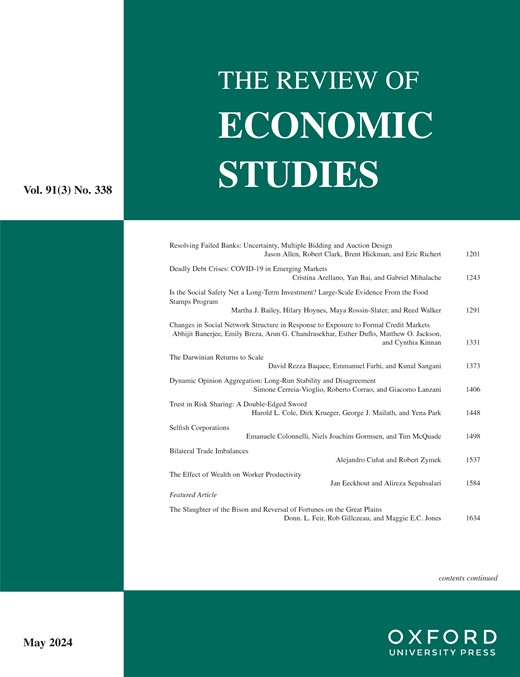Does Pricing Carbon Mitigate Climate Change? Firm-Level Evidence from the European Union Emissions Trading System
IF 5.9
1区 经济学
Q1 ECONOMICS
引用次数: 0
Abstract
In theory, market-based regulatory instruments correct market failures at least cost. However, evidence on their efficacy remains scarce. Using administrative data, we estimate that, on average, the EU ETS – the world's first and largest market-based climate policy – induced regulated manufacturing firms to reduce carbon dioxide emissions by 14-16% with no detectable contractions in economic activity. We find no evidence of outsourcing to unregulated firms or markets; instead, firms made targeted investments, reducing the emissions intensity of production. These results indicate that the EU ETS induced global emissions reductions, a necessary and sufficient condition for mitigating climate change. We show that the absence of any negative economic effects can be rationalized in a model where pricing the externality induces firms to make fixed-cost investments in energy-saving capital that reduce marginal variable costs.碳定价能缓解气候变化吗?来自欧盟排放交易体系的公司层面证据
从理论上讲,基于市场的监管手段能以最低成本纠正市场失灵。然而,有关其有效性的证据仍然很少。利用行政数据,我们估计欧盟排放交易计划--世界上第一个也是最大的基于市场的气候政策--平均促使受监管的制造企业减少了 14-16% 的二氧化碳排放,而经济活动却没有出现可察觉的收缩。我们没有发现向不受管制的企业或市场外包的证据;相反,企业进行了有针对性的投资,降低了生产的排放强度。这些结果表明,欧盟排放交易计划诱导了全球减排,这是减缓气候变化的一个必要且充分的条件。我们的研究表明,在一个模型中,外部性的定价会促使企业对节能资本进行固定成本投资,从而降低边际可变成本,在此模型中,没有任何负面经济效应是合理的。
本文章由计算机程序翻译,如有差异,请以英文原文为准。
求助全文
约1分钟内获得全文
求助全文
来源期刊

Review of Economic Studies
ECONOMICS-
CiteScore
10.40
自引率
3.40%
发文量
75
期刊介绍:
Founded in 1933 by a group of young British and American economists, The Review of Economic Studies aims to encourage research in theoretical and applied economics, especially by young economists. Today it is widely recognised as one of the core top-five economics journals. The Review is essential reading for economists and has a reputation for publishing path-breaking papers in theoretical and applied economics. The Review is committed to continuing to publish strong papers in all areas of economics. The Editors aim to provide an efficient and high-quality review process to the Review''s authors. Where articles are sent out for full review, authors receive careful reports and feedback. Since 1989 The Review has held annual May Meetings to offer young students in economics and finance the chance to present their research to audiences in Europe.
 求助内容:
求助内容: 应助结果提醒方式:
应助结果提醒方式:


